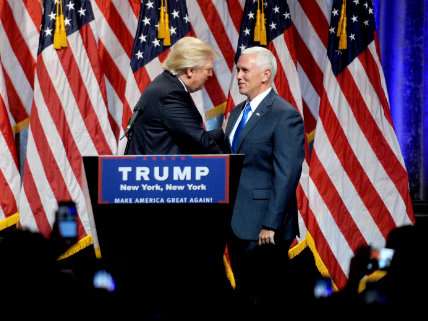Donald Trump Says Mike Pence's Support for the Iraq War Doesn't Matter—But Hillary Clinton's Does
Trump misstates his own position on the war, excuses his running mate for an error of judgment he says his opponent wasn't entitled to make.

In a side-by-side interview last night with running mate Mike Pence, Donald Trump insisted that he was against the Iraq war from the start, said it didn't matter that Pence had supported the war, and declared that it did matter that his Democratic opponent Hillary Clinton had backed the invasion.
It's as succinct an encapsulation of Trump's freewheeling approach to politics as you're likely to see: In the space of about a minute, Trump misrepresents his own past statements, excuses his ally's position as a small mistake as unimportant, and eventually insists that his opponent is not entitled to have made the same error.
During the exchange with Leslie Stahl of 60 Minutes, Trump criticized the Iraq war and said that he "was against the war in Iraq from the beginning."
As Buzzfeed Andrew Kaczynski reported back in February, this isn't true. Trump's earliest known statement on the war comes from a 2002 interview with Howard Stern in which he says he is for the invasion, though he wished that the first war in Iraq had been "done correctly." Trump has provided no other evidence, and no one has found any, that he was against the war from the start. (Trump's campaign has pointed to a 2003 statement as evidence for his position on Iraq.) So as far as anyone can tell, Trump's repeated declarations that he was always against the war are false.
In last night's interview, however, Trump also said it no big deal that his running mate, Indiana Gov. Mike Pence, did support the war.
"I don't care," is how Trump responded after Stahl asked about Pence's support for the invasion. Trump added that the vote was "a long time ago. And he voted that way and they were also misled. A lot of information was given to people—" Stahl pressed Trump further on the question, and he eventually declared that Pence could be excused. "He's entitled to make a mistake every once in a while," Trump said.
The kicker? Trump then said that unlike Pence, Hillary Clinton is not entitled to have made such a mistake.
Here's the relevant section of the 60 Minutes exchange:
TRUMP: He's entitled to make a mistake every once in a while.
STAHL: But she's not? Okay, come on—
TRUMP: But she's not—
STAHL: She's not?
TRUMP: No. She's not.
So Trump is willing to excuse Pence, but not Hillary Clinton, even as he misrepresents his own position on the war.
The ease with which Trump excuses Pence's support for the war, but not Clinton's, is further evidence that Trump's positions, to the extent that they exist and can be determined, are essentially meaningless except for the immediate political value he hopes to extract from them. Trump does not actually believe that Clinton's support for the war is an important window into her judgment and character, or else he would not have excused Pence so breezily. Instead, he believes that Clinton's previous support for the Iraq war makes for a convenient political attack. His own retconned "opposition" to the Iraq war is just as meaningful, which is to say, just as meaningless.
(Alternatively, this is an admission by Trump that he simply doesn't think Pence matters very much. In Trump's mind, his vice presidential pick, despite serving as a potential replacement president, is irrelevant to the ticket.)
The good news here, if there is any, is that both major party political candidates now say that the Iraq war was a mistake. (Here's Clinton's admission that it was an error.) But both candidates are fighting for anti-war cred that neither of them have.


Show Comments (10)